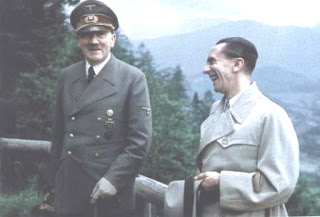In the first place, the story is incredible on its face. Are we supposed to believe that Goebbels instigated widespread domestic disorder on his own initiative and that Hitler, when he found out, was enraged but let him stay in the government? It really is hard to believe.
Goebbels had not anticipated either Hitler’s fury or, probably, such an uncontrollable, chaotic orgy of destruction. Not surprisingly [?] he made no reference to this unwelcome turn of events in his diary. [Irving, Goebbels, p. 497]
We are even supposed to believe that Goebbels, who insisted on accurate reports about the progress of the war1, for his own private consumption wrote statements that he knew to be false:
He … was careful to record this — perhaps slanted — note in his diary, which stands alone, and in direct contradiction to the evidence of Hitler’s entire immediate entourage: ‘He is in agreement with everything. His views are quite radical and aggressive. The Aktion itself went off without a hitch. A hundred dead. But no German property damaged.’ Each of these five sentences was untrue, as will be seen. [p.498]
Instead of making the obvious observation that a diary in which a man appears to lie to himself might not be authentic, Irving accepts that Goebbels lied to himself in his own diary, justifying that position with the innuendo that Goebbels was not quite sane. Either way it is admitted that the so-called Goebbels diaries are an unreliable source.
The clear intention behind those untruthful statements in the “Goebbels diaries” is to expand responsibility for Kristallnacht to Hitler and his government, instead of letting Goebbels appear as a rogue instigator as rumored in 1938. It serves the victors’ agenda of criminalizing the defeated German government.
The later entry, which I think is the 27th of March [1942], is widely quoted to uphold or support the extermination thesis. It is not consistent with entries in the diary like this one of March 7th, and it is not consistent with entries at a later date from the Goebbels diaries, and it is not consistent with German documents from a later date.
[…] there is a great doubt about the authenticity of the entire Goebbels diaries because they are written on typewriter. We have no real way of verifying if they are accurate, and the U.S. Government certified, in the beginning of the publication, […] that it can take no responsibility for the accuracy of the diaries as a whole.
[…] I think again it is worth mentioning that the passage of the 27th of March is inconsistent with the passage of the 7th of March and the one from April, and I don’t remember the date exact (Transcript, p. 5820-5821).
Goebbels had no responsibility for Jewish policy. He wasn’t involved in that. He was the Propaganda Minister. He was involved only to the extent that there were Jews in Berlin and he was responsible for Berlin (p. 5822-5823).
The photographic images of handwritten diaries dated earlier than July 1941 are also unverifiable as to authorship, because images of handwriting can be rearranged to make the writer say things that he did not. These alleged documents come from Soviet state archives, from a government that is well known to have produced false documentary evidence relating to the so-called Holocaust (e.g. the documents framing John Demjanjuk as “Ivan the Terrible”).
Most likely there were some real Goebbels diaries that were altered to create what the world has been shown as “the Goebbels Diaries” since 1945. That would explain why, as Weber testified, there are internal contradictions and contradictions with known fact in the diaries.
If the “Goebbels diaries” are fake, then there is little evidence to support the claim that Goebbels was the instigator of anti-Jewish violence on Kristallnacht. In that case everything else about Goebbels’ behavior, and Hitler’s behavior toward him, makes a lot more sense.
_________________________________
2. David Irving, “Revelations from Joseph Goebbels’ Diary,” The Journal of Historical Review, January-February 1995 (Vol. 15, No. 1), pages 2-17
3. These quotes of Weber’s testimony came from Robert Faurisson, “Mark Weber Must Resign from the Institute for Historical Review,” 3 April 2009, posted on The Unofficial Blog of Robert Faurisson. You can get more of the context by reading a summary of Weber’s testimony and the responses in Barbara Kulaszka, Did Six Million Really Die? — Report of the Evidence in the Canadian “False News Trial of Ernst Zündel, Samisdat Publishing, Toronto (1992).
